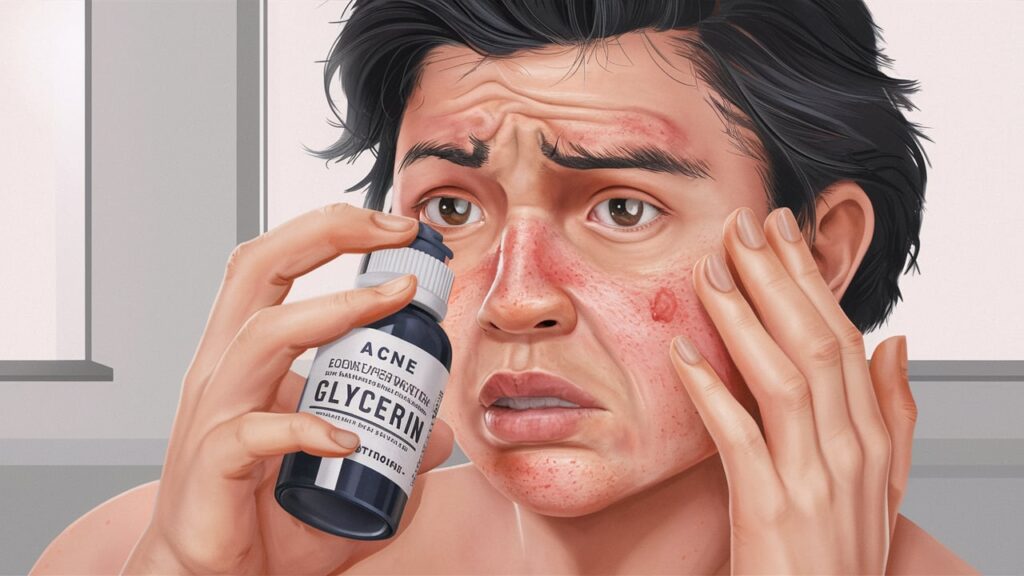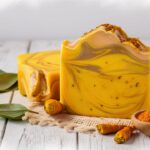- Glycerin may help with acne, but it is not a miracle cure.
- Research suggests glycerin has anti-inflammatory and hydrating properties that can benefit acne-prone skin.
- Glycerin may be a beneficial ingredient for maintaining skin hydration without worsening acne.
- User experiences with glycerin for acne are mixed, with some reporting significant improvements and others seeing no effect.
- DIY treatments combining glycerin with other natural ingredients are gaining popularity, but results may vary.
In a year marked by skincare innovations and a surge in “skinimalism,” an unexpected player has entered the acne treatment arena. Glycerin, a long-standing ingredient in many moisturizers, is now being hailed by some experts as a potential acne solution. some dermatologists even suggesting that glycerine and acne have a unique relationship that could be key to unlocking clearer skin.
This renewed interest comes at a time when maskne (acne caused by wearing face masks) continues to be a concern, despite the waning of the COVID-19 pandemic. With the global acne treatment market projected to reach $13.1 billion by 2026, according to a recent report by Market Research Future, the search for effective yet gentle acne solutions has never been more pressing.
But can glycerin, often overshadowed by flashier actives like retinoids and alpha-hydroxy acids, really make a difference in the fight against glycerine for acne?
Today, we dive deep into the science, expert opinions, and real-world experiences to uncover the truth about glycerine benefits for acne and its potential in managing acne-prone skin.
The Science behind Glycerin and Acne
Glycerin, also known as glycerol, is a natural compound derived from plant oils or synthesized from petroleum. Glycerine is commonly used in skincare products due to its humectant properties, which means it attracts and retains moisture. This characteristic alone makes glycerin a key ingredient in maintaining skin hydration and health.
Anti-Inflammatory and Collagen-Enhancing Effects
Research indicates that glycerin has anti-inflammatory and collagen-enhancing effects on the skin. These properties are particularly beneficial for acne-prone skin by reducing inflammation and supporting skin repair.
A study published on ResearchGate highlights glycerine’s holistic approach to improving skin health, noting its potential in managing acne-related issues by calming irritated skin and promoting healing.
Improving Skin Hydration
One of the significant advantages of glycerine is its ability to increase hydration in the top layer of the skin. When searching for the best glycerine products for acne, it’s essential to consider those that enhance skin barrier function, helping to prevent acne lesions from becoming dry and irritated. According to Healthline, maintaining adequate moisture levels is crucial in preventing further breakouts and supporting the skin’s natural healing processes.
The Secret to Soft, Hydrated Skin: Glycerin Soap Benefits
Protecting Against Irritants and Accelerating Wound Healing
Glycerin’s protective properties extend to shielding the skin from external irritants and accelerating wound healing. This is particularly useful in treating active acne and preventing post-inflammatory hyperpigmentation.
Many people wonder, is glycerine good for acne, and the answer is yes. A study available on the National Center for Biotechnology Information (NCBI) underscores glycerin’s role in protecting and repairing the skin, making it a valuable ingredient in acne treatment regimens.
Controlling Sebum Production
Another benefit of glycerin is its ability to maintain skin hydration, which in turn can prevent the overproduction of sebum—a common culprit in acne formation. Glycerine can help reduce the appearance of acne over time. The Purple Magazine discusses how glycerin’s moisturizing properties help balance oil production, reducing the likelihood of clogged pores and breakouts.
Safety and Acceptance
Glycerin is generally recognized as safe by the FDA and is widely used in various skincare products for its ability to attract and retain moisture. ScienceDaily reports on its acceptance and widespread use of glycerin, emphasizing its contribution to overall skin health and resilience.
Dermatologists Weigh In
Dr. Dan Belkin’s Perspective
Dr. Dan Belkin, a board-certified dermatologist based in New York, describes glycerin as a humectant that helps the skin hold onto water, making the skin appear smoother.
And, to answer the question, can i use glycerine for acne prone skin, Dr. Belkin notes that glycerin’s ability to maintain moisture can be particularly beneficial for individuals with acne-prone skin, as it helps keep the skin barrier intact and reduces the risk of irritation”.
Dr. Sejal Shah’s Insights
Dr. Sejal Shah, another board-certified dermatologist in New York City, echoes this sentiment. She explains that glycerin for face care draws moisture from the environment and the skin, boosting hydration without causing acne.
“Glycerin’s hydrating properties help prevent acne prevention by reducing the dryness and irritation that can exacerbate breakouts,” says Dr. Shah.
Real-World Results: User Experiences
Across various online platforms, users have been sharing their experiences with glycerin for acne.
On Reddit’s SkincareAddiction community, opinions are mixed. One user shared,
“Adding a glycerin-based moisturizer to my routine really helped balance my skin. My acne has reduced, and my skin feels less oily throughout the day.”
However, another user cautioned, “Glycerin didn’t work for me. It felt too heavy on my skin and seemed to make my breakouts worse.”
TikTok has seen a surge in glycerine skin care-related content, with some users praising its hydrating properties for acne-prone skin.
One viral video creator claimed, “Glycerin changed my skin. It’s the only thing that hydrates my skin without breaking me out.”
A YouTube video featuring expert dermatologists has comment sections filled with user testimonials. One commenter wrote, “I was skeptical at first, but after incorporating glycerin into my routine, my skin is clearer or more balanced. However, it’s essential to be aware of potential glycerine side effects and use it in moderation.”
On specialized forums like Acne.org, detailed user reviews provide a more nuanced picture. A long-term member shared, “Glycerin has been a game-changer for my acne-prone skin. It’s not a miracle cure, but it’s improved my skin’s texture and reduced the frequency of my breakouts.”
Insights from Acne.org
Specialized forums like Acne.org contain detailed user reviews on the use of glycerin. Users share both positive and negative outcomes, providing a comprehensive view of glycerin’s role in acne treatment. Oily skin can be particularly challenging, but with the right approach, glycerin can be beneficial.
One detailed review stated, “Glycerin helped soothe my irritated skin and kept it moisturized, but it didn’t completely clear my acne. I found it worked best when used as part of a broader skincare routine.”
So, is glycerine really effective for acne?
Glycerin is a humectant, meaning it draws moisture into the skin. This might sound counterintuitive for acne-prone skin, but the key is balance.
- Hydration is key: Contrary to popular belief, dry skin can actually increase oil production, leading to more breakouts in oily skin. Glycerin helps maintain optimal hydration levels, preventing excessive oiliness.
- Non-comedogenic: Glycerin itself doesn’t clog pores, making it suitable for acne-prone skin.
- Soothes inflammation: Glycerin can help calm irritated skin, reducing redness and discomfort associated with acne.
- While glycerin isn’t a magic cure for acne, it can be a valuable addition to your skincare routine. By helping to balance your skin’s moisture levels and soothe inflammation, it can contribute to clearer skin.
Remember that acne is a complex condition with various underlying causes. For persistent or severe acne, consulting a dermatologist is essential.
The Verdict:
After examining the research, expert opinions, and user experiences, it’s clear that glycerin may have potential benefits for acne-prone skin. Its ability to hydrate without adding excess oil, coupled with its anti-inflammatory properties, makes it a promising ingredient for those struggling with acne, including those with sensitive skin.
While many users report positive experiences with glycerin, others find it ineffective or even problematic for their skin. As with any skincare ingredient, individual results may vary.
If you’re considering incorporating glycerin into your acne-fighting routine, here are a few tips:
- Start slowly: Introduce glycerin-containing products gradually to see how your skin reacts.
- Look for products with the right formulation: Opt for lightweight, non-comedogenic products that contain glycerin along with other acne-fighting ingredients.
- Consult a dermatologist: If you have persistent or severe acne, it’s always best to seek professional advice.
Glycerin may not be a miracle cure for acne. Still, scientifically-backed benefits and positive user experiences suggest that it could be a valuable addition to many acne-prone skincare routines. As research continues to unfold, we may discover even more ways that this versatile ingredient can help in the fight against acne.
Alternatives to glycerine: Effective acne treatments
While glycerin shows promise in managing acne-prone skin, it’s not the only option available. For those seeking alternatives or looking to complement their glycerin-based skincare routine, here are some well-established acne treatments:
Salicylic Acid: This beta-hydroxy acid (BHA) is a powerhouse in acne treatment. It penetrates pores, exfoliates dead skin cells, and helps reduce inflammation. Many over-the-counter cleansers, toners, and spot treatments contain salicylic acid.
Benzoyl Peroxide: Known for its ability to kill acne-causing bacteria, benzoyl peroxide is a common ingredient in both OTC and prescription acne treatments. It’s particularly effective for inflammatory acne but can be drying, so start with lower concentrations.
Retinoids: Topical retinoids like adapalene (now available over-the-counter) and prescription tretinoin are derived from vitamin A. They help unclog pores, reduce inflammation, and promote cell turnover, making them effective for both treating and preventing acne.
Niacinamide: This form of vitamin B3 has gained popularity for its ability to regulate oil production, reduce inflammation, and improve overall skin texture. It’s often well-tolerated by sensitive skin types.
DIY Glycerin Treatments for Acne
As interest in glycerin’s acne-fighting potential grows, many skincare enthusiasts are experimenting with homemade treatments.
Let’s explore some popular DIY options:
Homemade Glycerin Acne Mask
A simple glycerin mask can be made by mixing equal parts glycerin and aloe vera gel. Apply this mixture to clean skin, leave for 15-20 minutes, and then rinse off with lukewarm water. Users report that this mask helps soothe inflammation and hydrate acne-prone skin without clogging pores.
Glycerin and Rose Water for Acne
The combination of glycerin and rose water has gained traction in skincare communities. Mix one part glycerin with three parts rose water to create a hydrating toner. This mixture can be applied with a cotton pad after cleansing. Rose water’s anti-inflammatory properties complement glycerin’s moisturizing effects, potentially helping to calm acne-prone skin.
Glycerin and Aloe Vera for Acne
Aloe vera’s soothing properties make it a natural partner for glycerin in acne care. Combine equal parts of glycerin and pure aloe vera gel to create a light, hydrating serum. Apply this mixture before your moisturizer to help calm irritation and provide hydration without greasiness.
FAQ: Glycerin and Acne
Q: Can glycerin clog pores?
A: Glycerin is generally non-comedogenic, meaning it’s unlikely to clog pores. However, everyone’s skin is different, so it’s always best to patch test new products.
Q: How often should I use glycerin on my acne-prone skin?
A: Glycerin can typically be used daily. Start with once a day and increase to twice daily if your skin responds well.
Q: Can glycerin replace my acne medication?
A: No, glycerin should not replace prescribed acne treatments. It can complement your existing routine but consult your dermatologist before making changes.
Q: Is pure glycerin safe to use on the face?
A: While pure glycerin is generally safe, it’s best to use products formulated with glycerin for facial use. Pure glycerin can be too concentrated and may draw moisture from deeper skin layers if used alone.
Q: Can glycerin help with acne scars?
A: Glycerin may help improve the appearance of acne scars by keeping the skin hydrated and supporting the healing process. However, for significant scarring, professional treatments may be more effective.
Q: Is glycerin suitable for all skin types? A: Glycerin is generally well-tolerated by all skin types, including oily and acne-prone skin. However, as with any skincare ingredient, individual reactions may vary.
Q: How long does it take to see results when using glycerin for acne? A: Results can vary, but many users report improvements in skin hydration within a few days. For acne-related benefits, it may take several weeks of consistent use to notice significant changes.

I’m a devoted organic skincare enthusiast, passionate about the natural, wholesome goodness that organic products bring to our skin.
Organic skincare isn’t just a hobby for me—it’s a lifestyle. Every product I use, recommend, and write about has been carefully chosen for its purity and effectiveness. Everything I write about is backed by scientific studies, dermatologists’ opinions, and user experiences.
I also excel at tackling skincare challenges with innovative, organic solutions.


